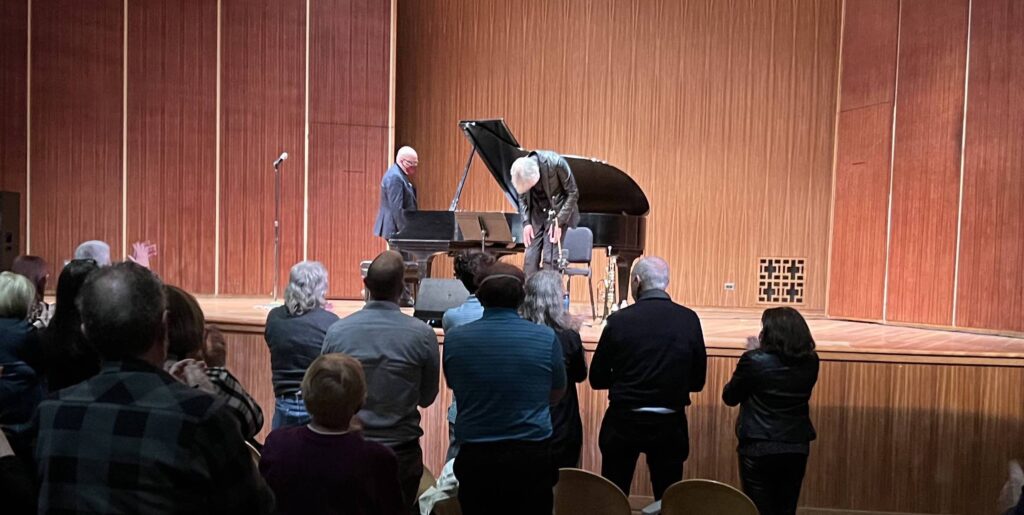After a two-year postponement, pianist Ethan Iverson and trumpeter Tom Harrell came to Buffalo for their duo concert at Kleinhans Music Hall’s Mary Seaton Room. Originally scheduled for March 2020, this was the first concert on my calendar to be pushed back or canceled outright due to COVID-19 restrictions. (With Chicago’s Ring Cycle being the second…) Now, more than two years later, it was the first acoustic jazz concert I’ve seen as an audience member since then. This was my first time seeing either musician perform live and hopefully not the last.
(For additional context, a pre-concert interview is here.)
The concert was a compelling 80-minute journey through the The Tradition via The American Songbook and a couple of Harrell originals. An “evening of standards” can go in many directions (good and bad), and the duo deftly navigated the musical waters in a way that was consistently refreshing. On the one hand, their approach was traditional: recognizable tunes, clear melodic lines, alternating solos within the prescribed forms. However, within that rubric there was much variety: harmonic and rhythmic exploration, stylistic wandering (with Iverson occasionally drawing on European classical influences), a wide textural range—notable considering the duo format.
The 11-song set was pretty evenly divided. Each piece was several minutes in length, and I don’t think there was one instance of someone soloing for more than two consecutive choruses. The set ran The Tradition’s gamut, from medium-tempo numbers (“Sentimental Journey,” “I’m Getting Sentimental Over You,” “I Remember You”), to blues (“Philadelphia Creamer,” an Iverson original), to up-tempo swing (“All The Things You Are,” Harrell’s “Improv”), rhythm changes (“Wee”), ballads (“I Can’t Get Started,” “The Man I Love”), and modern fare (Harrell’s “Journey To The Stars”). (Full disclosure: I am missing one title, as there was one tune I couldn’t name.) Many of the tunes are featured on 2019’s Common Practice (ECM), a fun album that showcases Iverson and Harrell in a quartet setting. But the duo format put those same pieces in a new relief, and it nicely highlighted Harrell’s more intimate, understated approach.
Harrell spent most of the evening on flugelhorn, which was a real treat. His full, warm sound complemented the piano nicely. He did play trumpet on two or three occasions in the latter half of the set, but not for a full tune. I appreciated his approach to melodies—straightforward but not plain, providing a nice contrast to his more searching improvisations. His two originals were nice additions. “Improv” was a post bop romp that fit right in with the evening’s standards theme. And “Journey to the Stars” went perhaps the farthest astray from that same theme, with Iverson’s arpeggiated harmonies* and Harrell’s haunting lines.
Given the duo setting, especially when paired with a monodic instrument, Iverson had his work cut out for him and more than rose to the occasion. He was often a one-man rhythm section and sometimes even a one-man horn section. And his melodic approach was diverse, from his borderline shout chorus on “I Remember You” (which sounded like a horn soli) to his crystalline single-note lines and everything in between. His bouncy, bluesy clusters on “Sentimental Journey” filled the hall, and his sparse melodic lines on “I Can’t Get Started” showcased Iverson’s expansive textural range. (And for those familiar with Iverson’s writing, particularly on jazz standards, he practices what he preaches: his playing evinces a keen interplay between the bass and melody, with more emphasis on counterpoint than “chord scales.”)
My only complaint is that the performance didn’t last longer, but it’s better than the alternative. The concert was more than worth the wait. My only hope is that it won’t be another two years until I can see either artist again.

(photograph by me)
Also, it was nice to briefly meet Ethan Iverson after the concert. He’s just as friendly in person as online (where I occasionally tweet at him, usually about Keith Jarrett).
*I should admit, with apologies to the artists, that Iverson’s arpeggiating briefly reminded me of Collective Soul’s “December,” which proved distracting for a few seconds. Not that Collective Soul invented such arpeggiation—far from it—but that’s where my mind took me. Ah well…

